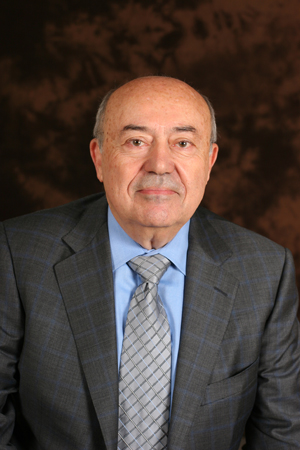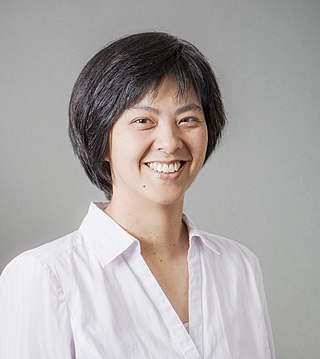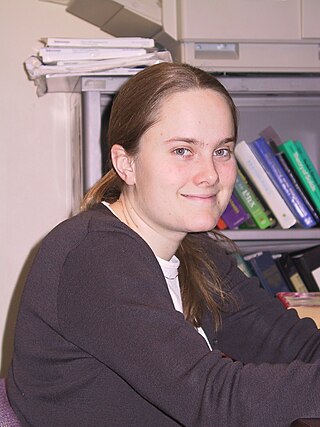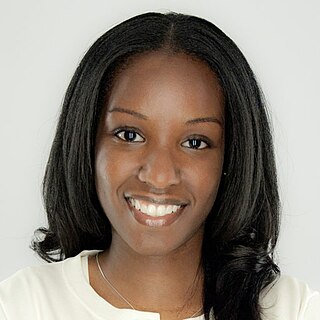Related Research Articles

Andrew James Viterbi is an Italian Jewish–American electrical engineer and businessman who co-founded Qualcomm Inc. and invented the Viterbi algorithm. He is the Presidential Chair Professor of Electrical Engineering at the University of Southern California's Viterbi School of Engineering,which was named in his honor in 2004 in recognition of his $52 million gift.

Simon "Si" Ramo was an American engineer,businessman,and author. He led development of microwave and missile technology and is sometimes known as the father of the intercontinental ballistic missile (ICBM). He also developed General Electric's electron microscope. He played prominent roles in the formation of two Fortune 500 companies,Ramo-Wooldridge and Bunker Ramo Corporation.

Scott E. Fraser is an American biophysicist and Provost Professor of Biological Sciences and Biomedical Engineering at the University of Southern California (USC). He is also the Elizabeth Garrett Chair in Convergent Bioscience and Director of Science Initiatives,where he is helping to launch USC’s Initiative in Convergent Bioscience. In addition,he holds joint appointments in the Departments of Physiology and Biophysics,Stem Cell Biology and Regenerative Medicine,Pediatrics,Radiology,and Ophthalmology.

Neil Gilbert Siegel is an American computer scientist,systems engineer,and engineer,known for his development of many key systems for the United States military,including the Blue-Force Tracking system,the U.S. Army's first unmanned air vehicle system,and the US Army forward-area air defense system. Several of his inventions also found their way into consumer products,such as hand-held devices whose map displays automatically orient themselves to align with the real-world's cardinal points.
Maja Matarić is an American computer scientist,roboticist and AI researcher,and the Chan Soon-Shiong Distinguished Professor of Computer Science,Neuroscience,and Pediatrics at the University of Southern California. She is known for her work in human-robot interaction for socially assistive robotics,a new field she pioneered,which focuses on creating robots capable of providing personalized therapy and care that helps people help themselves,through social rather than physical interaction. Her work has focused on aiding special needs populations including the elderly,stroke patients,and children with autism,and has been deployed and evaluated in hospitals,therapy centers,schools,and homes. She is also known for her earlier work on robot learning from demonstration,swarm robotics,robot teams,and robot navigation.
Chung-Chieh Jay Kuo is a Taiwanese electrical engineer and the director of the Multimedia Communications Lab as well as distinguished professor of electrical engineering and computer science at the University of Southern California. He is a specialist in multimedia signal processing,video coding,video quality assessment,machine learning and wireless communication.

Ellis Meng is the Shelly and Ofer Nemirovsky Chair of Convergent Biosciences and Professor of Biomedical Engineering and Electrical and Computer Engineering in the Viterbi School of Engineering at the University of Southern California,where she also serves as the Vice Dean of Technology Innovation and Entrepreneurship. Meng is highly decorated in the development of novel micro- and nanotechnologies for biomedical applications. In 2009,Meng was named on MIT Technology Review's "Innovators Under 35" List for her work on micropumps that deliver drugs preventing blindness,and she was listed on the 40 Under 40 List of the Medical Device and Diagnostic Industry (MDDI) in 2012.

Andrea Martin Armani is the Ray Irani Chair in Engineering and Materials Science and professor of chemical engineering and materials science at the USC Viterbi School of Engineering. She was awarded the 2010 Presidential Early Career Award for Scientists and Engineers from Barack Obama and is a World Economic Forum Young Global Leader.
Michelle Effros is the George Van Osdol Professor of Electrical Engineering at the California Institute of Technology. She has made significant contributions to data compression.

Michelle Povinelli is a Professor of Electrical Engineering and Physics and Astronomy at the University of Southern California (USC) and Fellow of the OSA and SPIE. Povinelli's research in nanophotonics focuses on the behavior of light inside complex materials.
Maryam M. Shanechi is an Iran-born American neuroengineer. She studies ways of decoding the brain's activity to control brain-machine interfaces. She was honored as one of MIT Technology Review's Innovators under 35 in 2014 and one of the Science News 10 scientists to watch in 2019. She is Professor and Viterbi Early Career Chair in Electrical and Computer Engineering at the Viterbi School of Engineering,and a member of the Neuroscience Graduate Program at the University of Southern California.
Timothy M. Pinkston is an American computer engineer,researcher,educator and administrator whose work is focused in the area of computer architecture. He holds the George Pfleger Chair in Electrical and Computer Engineering and is a Professor of Electrical and Computer Engineering at University of Southern California (USC). He also serves in an administrative role as Vice Dean for Faculty Affairs at the USC Viterbi School of Engineering.
Richard M. Murray is a synthetic biologist and Thomas E. and Doris Everhart Professor of Control &Dynamical Systems and Bioengineering at Caltech,California. He was elected to the National Academy of Engineering in 2013 for "contributions in control theory and networked control systems with applications to aerospace engineering,robotics,and autonomy". Murray is a co-author of several textbooks on feedback and control systems,and helped to develop the Python Control Systems Library to provide operations for use in feedback control systems. He was a founding member of the Department of Defense's Defense Innovation Advisory Board as of 2016.
Petros A. Ioannou is a Cypriot American Electrical Engineer who made important contributions in Robust Adaptive Control,Vehicle and Traffic Flow Control,and Intelligent Transportation Systems.
Mahta Moghaddam is an Iranian-American electrical and computer engineer and William M. Hogue Professor of Electrical Engineering in the Ming Hsieh Department of Electrical and Computer Engineering at the University of Southern California Viterbi School of Engineering. Moghaddam is also the president of the IEEE Antennas and Propagation Society and is known for developing sensor systems and algorithms for high-resolution characterization of the environment to quantify the effects of climate change. She also has developed innovative tools using microwave technology to visualize biological structures and target them in real-time with high-power focused microwave ablation.
Jinliu "Grace" Wang is a Chinese American engineer and academic administrator who serves as the 17th president of Worcester Polytechnic Institute. Wang also served as interim president of the SUNY Polytechnic Institute from July 1,2018 to November 2020.

Josiane Zerubia is a French research scientist. She is the Director of Research at INRIA (DRCE),UniversitéCôte d'Azur. Dr. Zerubia has made pioneering research contributions. She has been the Principal Investigator of numerous projects like of the Ayin (2012-2016),the Ariana (1998-2011) and of the Pastis (1995-1997). Presently,she is leading as head of the Ayana exploratory project (2020-2023). She has been professor (PR1) at SUPAERO (ISAE) in Toulouse since 1999.
Alice Cline Parker is an American electrical engineer. Her early research studied electronic design automation;later in her career,her interests shifted to neuromorphic engineering,biomimetic architecture for computer vision,analog circuits,carbon nanotube field-effect transistors,and nanotechnology. She is Dean's Professor of Electrical and Computer Engineering in the USC Viterbi School of Engineering of the University of Southern California.

Stacey Finley is the Nichole A. and Thuan Q. Pham Professor and associate professor of chemical engineering and materials science,and quantitative and computational biology at the University of Southern California. Finley has a joint appointment in the department of chemical engineering and materials science,and she is a member of the USC Norris Comprehensive Cancer Center. Finley is also a standing member of the MABS Study Section at NIH. Her research has been supported by grants from the NSF,NIH,and American Cancer Society.

Ewa Deelman is an American computer scientist specializing in distributed computing and cloud computing for applications in scientific computing. Her contributions include leading the design of the Pegasus scientific workflow management system,used by the LIGO scientific collaboration to detect gravitational waves from binary black holes. She is a research professor of computer science in the USC Viterbi School of Engineering,and a principal scientist at the Information Sciences Institute,both part of the University of Southern California.
References
- 1 2 "USC - Viterbi School of Engineering - Viterbi Faculty Directory". viterbi.usc.edu.
- ↑ "Andrea Belz to lead NSF Division of Industrial Innovation and Partnerships". National Science Foundation. 21 February 2019. Archived from the original on 15 September 2023.
- ↑ "Financing Cascades: Sequencing Public and Private Funding in University Spinoffs | Request PDF".
- ↑ Belz, Andrea; Zapatero, Fernando; Terrile, Richard; Kawas, Michael; Giga, Aleksandar (17 April 2018). "Mapping the 'Valley of Death': Managing Selection and Technology Advancement in NASA's Small Business Innovation Research Program". IEEE Transactions on Engineering Management. 68 (5): 1476–1485. doi:10.1109/TEM.2019.2904441. S2CID 197445304. SSRN 3221328.
- ↑ "Ondax Names Belz To Board". socaltech.com. 4 January 2011. Archived from the original on 5 March 2011.
- ↑ "Coherent, Inc. Acquires Ondax". optics.org.
- ↑ "IEEE TEMS Executive Leadership Team". IEEE Technology and Engineering Management Society. Archived from the original on 14 March 2023.
- ↑ "Andrea Belz". ieeexplore.ieee.org. Archived from the original on 2023-09-15. Retrieved 2023-04-20.
- ↑ "NSF Speakers Series: Andrea Belz | Illinois Institute of Technology". www.iit.edu. 6 April 2022.
- ↑ Dvoredsky, Andrea Paulina (2000). Investigation of novel effects in semi-inclusive deep inelastic scattering (Thesis). California Institute of Technology. doi:10.7907/t0dm-y753.
- ↑ "NSF Speakers Series: Andrea Belz | Illinois Institute of Technology". www.iit.edu. 6 April 2022. Retrieved 2023-05-05.
- ↑ "For her, rocket science is just the start". Los Angeles Times. May 11, 2014.
- ↑ "USC, UCLA, Caltech get joint grant to fuel tech start-ups in L.A." Los Angeles Times. August 26, 2014.
- ↑ "Andrea Belz to lead NSF Division of Industrial Innovation and Partnerships". www.nsf.gov.
- ↑ "Patentopia – Management of INnovation, Entrepreneurial Research, and Venture Analysis (MINERVA)". sites.usc.edu.
- ↑ Belz, Andrea; Graddy-Reed, Alexandra; Shweta, Fnu; Giga, Aleksandar; Murali, Shivesh Meenakshi (2022). "Patentopia: A multi-stage patent extraction platform with disambiguation for certain semantic challenges". 2022 IEEE International Conference on Big Data (Big Data). Osaka, Japan. pp. 3478–3485. doi:10.1109/BigData55660.2022.10020918. ISBN 978-1-6654-8045-1. S2CID 256313635.
{{cite book}}: CS1 maint: location missing publisher (link) - ↑ Belz, Andrea; Graddy-Reed, Alexandra; Shweta, FNU; Giga, Alekandar; Murali, Shivesh Meenakshi (2023). "Deterministic bibliometric disambiguation challenges in company names". 2023 IEEE 17th International Conference on Semantic Computing (ICSC). Laguna Hills, CA, USA. pp. 239–243. doi:10.1109/ICSC56153.2023.00047. ISBN 978-1-6654-8263-9. S2CID 257451811. SSRN 4380684.
{{cite book}}: CS1 maint: location missing publisher (link)